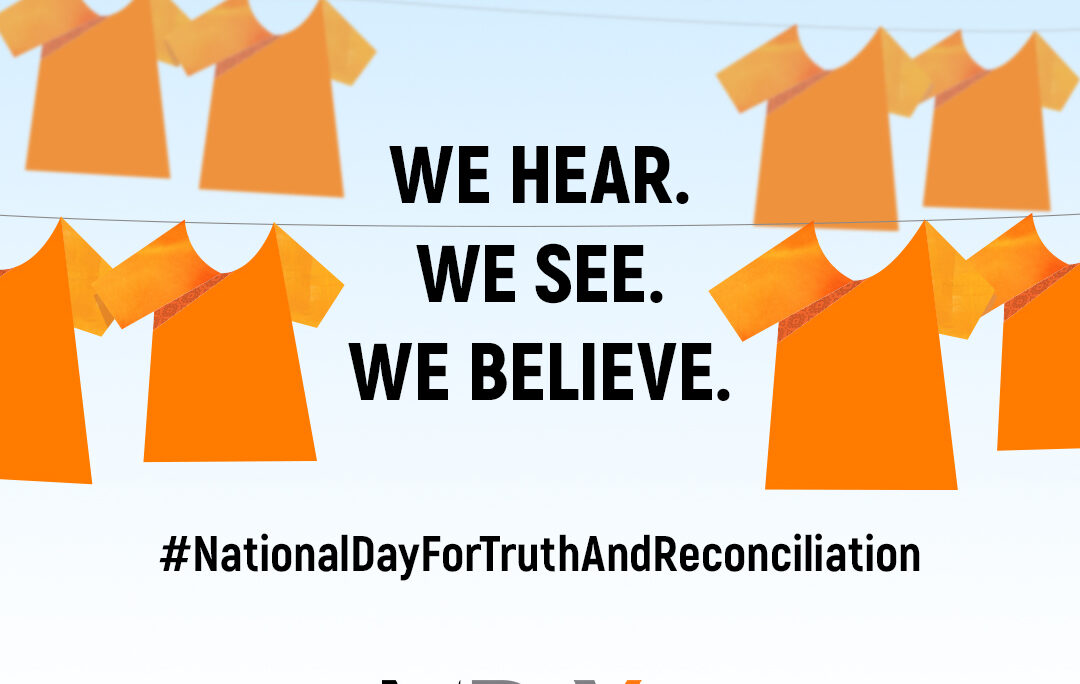The loss of a child is devastating.
The loss of a generation of children, part of a decimation of cultural identity, leaves wounds so deep, it scars families, entire communities, the country.
September 30, 2021, answered the call for the first National Day for Truth and Reconciliation, a recommendation by the Truth and Reconciliation Commission as one of its 94 Calls to Action. An annual day to honour the over 150,000 Indigenous children sent away to the residential school system, those that were lost, the survivors, their families, and Indigenous communities.
This day was originally commemorated as the Indigenous-led Orange Shirt Day, from the experience of Phyllis Webstad, a Northern Secwepemc (Shuswap) from the Stswecem’c Xgat’tem First Nation, who on her first day of school, was dressed in a new orange shirt which was taken from her. The orange shirt is now a symbol of being stripped of culture and self-esteem over generations. Orange shirts are now worn as a reclaiming of culture by Indigenous peoples, and a sign of support by the rest of Canada.
A Call to Reflect and Learn
For Indigenous peoples, September 30 was a day of mourning. Residential School survivor or ‘warrior’ as she prefers to be called, Geraldine Shingoose, described it as “a year of truth for us survivors” asking Canada to “see us, to hear us, and to believe us.”
Indigenous leaders called upon Indigenous and non-Indigenous people in the country to mark the day with solemn reflection. The Honourable Murray Sinclair or Mizanay Gheezhik, who served as chairman of the Truth and Reconciliation Commission, said Canadians should not forget what the schools did to Indigenous children and their families, but “to make it part of our national memory”, stressing that “education is the key to reconciliation”.
Company Initiatives and Brand Outreach
Corporate Canada reached out to acknowledge the National Day for Truth and Reconciliation. With emotions raw and the community hurting, it was important not to make it about marketing the Company and its brands, but about supporting Indigenous peoples in a manner that was meaningful, not just for one day, but as a commitment for long-term ongoing support.
For the first National Day for Truth and Reconciliation federal government employees and those in federally regulated industries such as energy, financial services and telecommunications closed for the day, giving employees time to reflect and learn, which fulfils one of the Truth and Reconciliation Commission’s 94 calls to action. Other organisations invited Indigenous survivors and speakers to engage their employees. There was a push to buy orange shirts affiliated with Indigenous peoples.
Canadian consumers were watching, and expectations from their favourite brands to acknowledge, support and act, were high. Businesses can have an important part to play in reconciliation, but for a long time, many have felt that the onus of the job to facilitate reconciliation rested mainly with the government or with Indigenous peoples.
Here’s a brand that got it right. Tim Horton’s Orange Sprinkle Donut fundraiser was started by the brand’s local Indigenous owners, with 100% of the proceeds (excluding taxes) going towards the Orange Shirt Society, and the Indian Residential School Survivors Society (IRSSS). The fundraiser gained momentum with 1,500 Tim Horton’s restaurant owners across Canada taking part. Over one million orange sprinkle donuts sold out quickly, raising over $1.6 million. More importantly, they helped start conversations around the cause among diverse sections of Canadians.
Make a Commitment for Meaningful Change
As Indigenous survivors and educators advised on building respect for Indigenous peoples’ beliefs, cultures, traditions, worldviews, challenges, and goals, it was a sea of orange shirts, as many non-indigenous Canadians and companies responded, with support, shared reflection, listening, learning, and starting a conversation for change.
Truth and Reconciliation is more than just one day. The learning must continue. Here are some of the initiatives many Canadians found helpful, as they embarked on their journey of learning and support:
– Start by educating yourself on Indigenous culture, history and its impact, Indigenous Canada course from the University of Alberta
– Support Indigenous voices in storytelling, art, movies, events, podcasts, and broadcasts
– Support Indigenous small businesses, e.g. when you purchase your orange shirt
– Donate and help in raising awareness and healing
– Read and reflect on the 94 Calls to Action
– Learn as a family from Indigenous knowledge keepers. Join a library.
– Talk to your children. Here’s some advice from Grandmother Pahan Pte San Win
– Utilize government resources
– Join and support a Friendship Centre near you.
Whatever you choose to do to support the cause, ensure that it is not only for one day, but on an ongoing basis.Diversity Beyond Ethnicity is a marketing program of Maple Diversity Communications to provide advertising, marketing, and research solutions to enable brands to successfully identify with diverse consumer groups and achieve their business objectives. We ensure that your brand’s communication embraces the uniqueness of this audience and reaches them effectively through the most impactful media channels, leading to a strong brand-consumer connect. Get in touch with us for more information on how our team can help you reach the Indigenous segment.





